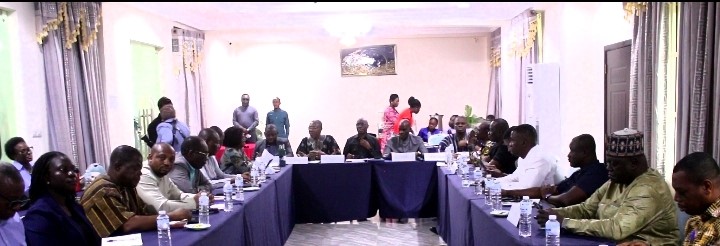Minister Unveils Ambitious Education Reforms and Strategic Vision

Key Priorities and Reforms in Ghana’s Education Sector
During a parliamentary committee session in Koforidua, the Minister of Education, Mr. Haruna Iddrisu, outlined the government’s key priorities and ongoing reforms aimed at transforming the education sector. His speech emphasized the need for improved foundational learning, higher education, and infrastructure development, while also highlighting the importance of legislative oversight to ensure transparency and accountability.
The minister stressed that these efforts are essential for using public resources effectively, particularly in supporting education, which is seen as a fundamental pillar of sustainable development. He pledged continued involvement in oversight activities, emphasizing their role in holding the Ministry and its agencies accountable.
Addressing Infrastructure Deficits
One of the major challenges highlighted by the minister was the significant infrastructure deficit in basic education. Despite the 1992 constitution guaranteeing free and compulsory basic education, there remains a shortfall of approximately 5,000 schools operating under trees. This issue underscores the urgent need for equitable financing in basic education, with the minister stating that “if the child gets it right at six years, you can predict the next 80 years of the child’s future.”
The government has committed to prioritizing basic education, particularly its financing, as a cornerstone for national development. However, the Free Senior High School (SHS) policy, while expanding access to education, has raised concerns about its sustainability. The minister pointed out that the policy lacks dedicated financing and relies on annual budget allocations from the Ghana Education Trust Fund (GETFund). This approach risks undermining GETFund’s primary mandate of infrastructure development, as funds have been diverted to support the Free SHS program.
Ensuring Examination Integrity
In addition to infrastructure and funding, the minister provided an update on the ongoing West African Examination Council (WAEC) examinations. He assured the public that thorough preparations were being made by the Ghana Education Service (GES) and WAEC, supported by government security and logistical efforts. An investigation into reported exam-related threats and malpractice was announced, with the government reaffirming its zero-tolerance stance on cheating.
The director-general of GES, Prof. Ernest Kofi Davis, was commended for ensuring the smooth conduct of the examinations despite some disturbances. The government remains committed to providing a secure and peaceful environment for students during the exams.
Expanding Higher Education Access
On the topic of higher education, the minister reaffirmed the government’s dedication to expanding access and enhancing quality across all levels. He highlighted the pending Ghana Scholarship Authority Bill, expressing optimism about its imminent passage despite previous procedural misunderstandings. The bill aims to formalize scholarship management and has gone through Cabinet, awaiting parliamentary approval.
The government has shown responsiveness to public input, incorporating constructive proposals from various stakeholders, including the Citizens Coalition on Education, the Minister for Gender, and the National Union of Ghana Students. A commitment to revising Clause 4 of the bill was made to ensure broader stakeholder representation on the governing council.
Crucially, the minister emphasized the need for dedicated financing for the Scholarship Authority, proposing that 2% of Ghana’s oil revenue be allocated to the authority to ensure sustainable funding. He also revealed that the country currently owes about 40 million pounds in outstanding scholarship debt, calling for a legal framework to address this issue.
Supporting Universities and Technical Education
The minister reported that deprived universities such as CK Tedam, UENR, SDD-UBIDS, and UHAS had each received GH₵10 million for infrastructure development, with plans to extend similar support to additional institutions. Government plans also include completing the teaching hospital at Kwame Nkrumah University of Science and Technology (KNUST), which requires an additional 46 million Ghana cedis and 38 million US dollars.
Reforms at KNUST also include a new legal framework to align its governance with contemporary needs. The minister advocated for technical and vocational education (TVET), calling it “the future of addressing the unemployment question in Ghana.” He announced plans to upgrade the Accra Technical Training College into a National Institute of Technology, modeled after Japan’s “KOSEN” system.
Enhancing Student Welfare
The government has released GH₵800 million to the Conference of Heads of Senior Secondary Schools (CHASS) for food procurement. Discussions are ongoing to share the responsibility for food supply, with proposals for Buffer Stock and the Ghana Commodity Exchange to handle 60% of the supply, while CHASS manages the remaining 40%. The president’s emphasis on improving quality, timely delivery, and appropriate quantities of food was reiterated.
Parliamentary Oversight and Collaboration
Mr. Peter Kwasi Nortsu-Kotoe, Chairman of the Parliamentary Select Committee on Education, welcomed the minister’s address, commending the Ministry’s efforts and expressing the Committee’s commitment to oversight. He acknowledged recent budget approvals and expressed satisfaction with reports from agency representatives.
The chairman also highlighted pressing challenges, including the “sweeping of agency accounts by the Ministry of Finance and the Controller and Accountant General’s Department,” urging the minister to facilitate the return of these funds. He called for urgent clearance to recruit staff for critical vacancies and praised the minister for prioritizing funding to WAEC, noting that 76.1% of the required resources for conducting the WASSCE and BECE had already been released.
“We believe strongly that with you in the seat, we will reset the agenda for education in the country,” Mr. Nortsu-Kotoe stated, assuring the minister of the Committee’s full support in advancing educational reforms.

Comments
Post a Comment